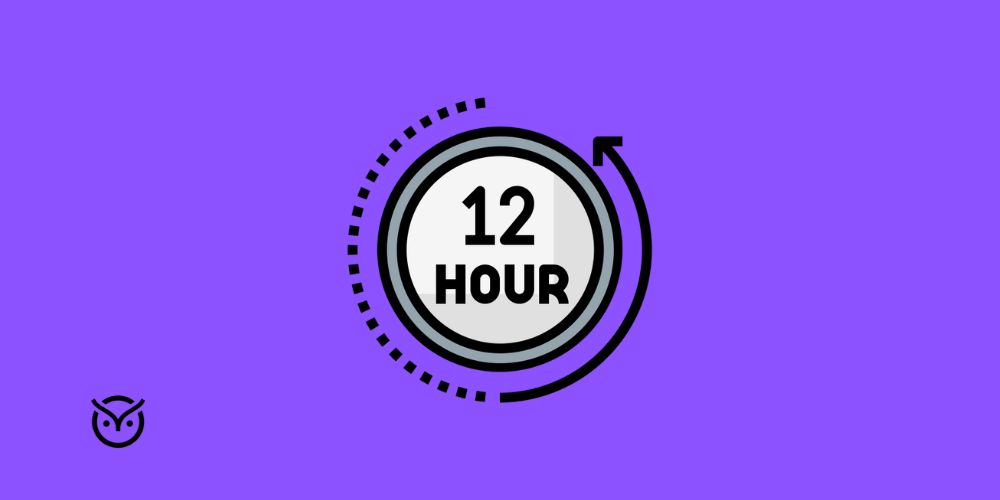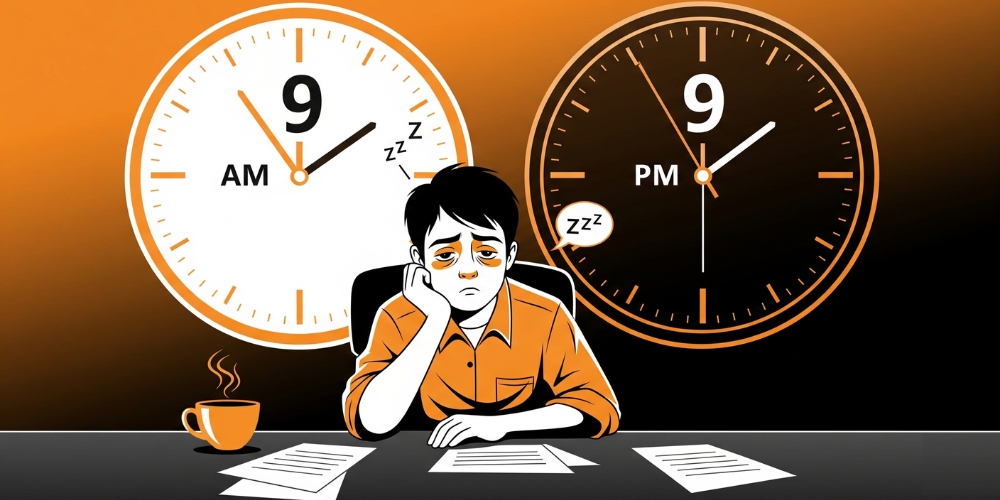
TL;DR
- Routines help you get through a 12 hour shift.
- Plan breaks and tasks to stay steady.
- Protect your body clock, especially at night.
- Build small habits to manage a 12 hour work day.
- Don’t ignore fatigue as it slows you down.
Starting out, facing how to get through a 12 hour shift can feel like trying to sprint a marathon. Your mind races, your body wonders how it can stay alert, and you’re not even sure where to focus. That uncertainty makes the longest shifts feel even longer.
The upside is that with a few steady habits and some planning, a 12 hour work day doesn’t have to feel impossible. This blog will cover why the hours feel long, how managers can get new hires set up the right way, and what you can do to keep your focus and energy on track.
Why 12-Hour Shifts Can Be Challenging for New Hires

Physical and Mental Load
Staying alert for twelve hours is tough. Fatigue builds up, concentration fades, and mistakes slip in more easily. The longer the shift goes, the harder it is to stay sharp, and that can quickly turn into safety issues if not managed well.
Body Clock Mismatch
When you’re new, your body hasn’t adjusted. Tack that on to how to get through a 12 hour night shift, and the challenge doubles. Working against your natural sleep rhythm leads to more mistakes, slower recovery, and can make your days off feel rougher than they need to.
Lack of Routine
New hires don’t have systems in place yet. You don’t know when to eat, how long to take for breaks, or how to pace your energy. That’s one reason why so many wonder how to survive a 12 hour shift. They’re flying blind.
Unrealistic Expectations
Sometimes people look in and think, “Am I the only one dragging?” or ask, is working 12 hours a day too much. Spoiler: it’s not that you’re weak. It’s just that your body is adjusting. Employers who expect steady performance without support push new hires into burnout quickly.
Sector Stresses
Some roles make long hours trickier. For example, folks might ask “Do cops work 12 hour shifts?” and yes, many do, and the demands on attention and stress levels are high. In factories, workers say working twelve hour shifts in lines or repetitive tasks is rough on joints and focus. These roles push new hires faster if there’s no prep or recognition.
How Employers Can Prepare New Hires for How to Get Through a 12-Hour Shift

When managers step in with real support, long shifts feel less heavy. Here are clear moves employers can take:
Design thoughtful schedules
Avoid too-frequent night rotations. Forward-rotating shifts (morning → evening → night in that order) help bodies adjust over time. Always build in at least 10 hours between shifts so new hires have time to rest.
Set up a solid onboarding routine
Teach early how to pace energy, where to take quick pauses, and how often to hydrate. Walk through when breaks happen and encourage leaning into them. Fatigue can slip up even the sharpest new person.
Create a supportive workspace
Bright lighting, good airflow, and clean break rooms. Just simple things help reduce fatigue and stay alert.
Teach healthy habits on the job
Provide sleep hygiene guidance using blackout curtains, keeping a regular sleep schedule, and talk about quick ways to reset during shifts. That helps new hires learn to survive a 12 hour night shift and avoid chronic stress.
Share big-picture risks and support
Let new hires know long shifts come with health risks like fatigue, mental strain, or long-term stress, and remind them the company is tracking wellness, not just output. Transparency builds trust and honesty around needs.
Tips for New Hires to get through a 12-Hour Shift

Here’s what works in the real world, shared by shift veterans and backed by findings:
Set up your night (or day!) ahead
Pack snacks, lay out your gear, fill your water bottle. Doing this the night before lightens mornings that feel rushed or foggy.
Sleep well and stick to it
Aim for a solid 7–9 hours before your shift. If it’s a night shift, use blackout curtains or an eye mask and keep noise low.
Hydrate and fuel up smart
Bring water and sip regularly. Eat small healthy snacks like nuts, fruits, and whole grains every few hours. Keeps energy steady, no slump.
Stay in motion
Take short breaks to stretch, walk, and breathe. Even a few minutes can reset your focus and shake off drowsy patches.
Mind your rest during shift
Cleveland Clinic states a 20–30‑minute nap can sharpen your alertness, unlike longer naps that leave you groggy.
Track what’s working
Keep note of what helps: snacks, timing of sleep, breaks. Adjust next shifts accordingly. That’s how you teach yourself how to survive factory shifts or 12 hr shifts wherever you work.
Common Mistakes New Hires Make on 12-Hour Shifts (and How to Avoid Them)

Here’s what trips people up and how to stay ahead of it:
Skipping breaks to “get more done”
That often backfires. Fatigue sneaks in, and tasks slow down. Breaks refresh your mind. Take them.
Eating a big meal too close to shift or then going long without food
A heavy meal can drag you; going without snacks starves your brain. Divide up meals and snacks every few hours.
Ignoring sleep rhythm
Don’t treat sleep as optional. Scrambling to catch up later creates more fatigue, not less.
Starting long shifts cold
Beginning a long shift without any mental or physical prep can wear you out quickly. Setting small routines beforehand makes it easier for your body to adjust.
Pushing past signals of fatigue
Ignoring the signs of tiredness usually backfires. When concentration slips, it’s often your cue to pause. Even a short break can help you return with better focus.
Common Mistakes New Hires Make on 12-Hour Shifts (and How to Avoid Them)
It’s hour 6, you’re starving, so you skip your break to get more work done. What happens?
At lunch, you eat a heavy meal with fries and soda. How does that play out?
You feel drowsy at hour 10 but push through without a micro-break. What’s the outcome?
Long-Term Strategies for Thriving on 12-Hour Shifts

Getting through a single shift is one thing. Thriving for months or years takes a smarter approach. Here’s what makes the difference:
Build Strong Sleep Routines
Consistent sleep habits are your anchor. Go to bed and wake up at roughly the same times, even on days off. Over time, your body clock steadies, which helps with working 12 hours a day or alternating 12 hour days at work. Using blackout curtains and keeping electronics away from bed can boost sleep quality.
Nutrition as Fuel, Not Just Food
Long shifts aren’t about coffee and vending machines. Think balanced meals such as lean protein, complex carbs, and healthy fats. Pack your food so you’re not forced into unhealthy options. Doing this helps sustain alertness across 12 hour workday cycles.
Fitness and Micro-Movement
Exercise outside work improves stamina at work. Even walking 20 minutes a day lowers stress, boosts mood, and helps sleep regulation. On the floor, stretch and shift posture every couple of hours. Small moves matter in keeping energy up during 12 hr shifts.
Protect Your Personal Time
When shifts end, it’s tempting to collapse. But making time for family, hobbies, or learning keeps burnout away. Some new hires even use their off days to pursue courses like GED vs high school diploma programs or training in new skills. It keeps life balanced and prevents work from swallowing everything.
Career Planning for Shift Workers
Long shifts don’t mean you can’t think long-term. Many industries running working twelve hour shifts, like health care, security, and logistics, also lead to supervisory or specialist roles. Keeping up with upskilling trends, like following AI hiring trends in your sector, shows you where opportunities are heading. Pairing with AI staffing solutions platforms also helps workers see flexible career moves while balancing demanding schedules.
Long-Term Strategies for Thriving on 12-Hour Shifts
Great path. Keep the routine steady, prep easy meals, and protect recovery time.
Conclusion
Mastering how to get through a 12 hour shift is about smart systems. Employers can set the stage with solid schedules and onboarding. New hires can build habits around rest, nutrition, and pacing. And long-term, routines and balance make sure these shifts become sustainable, not draining. With the right preparation, even marathon days at work turn into manageable, steady steps forward.




